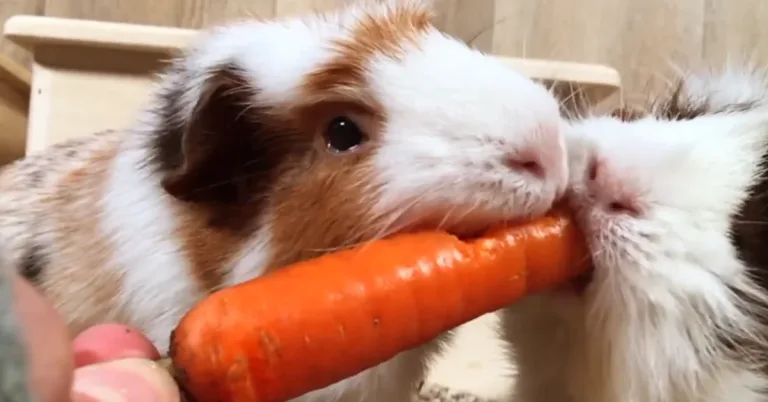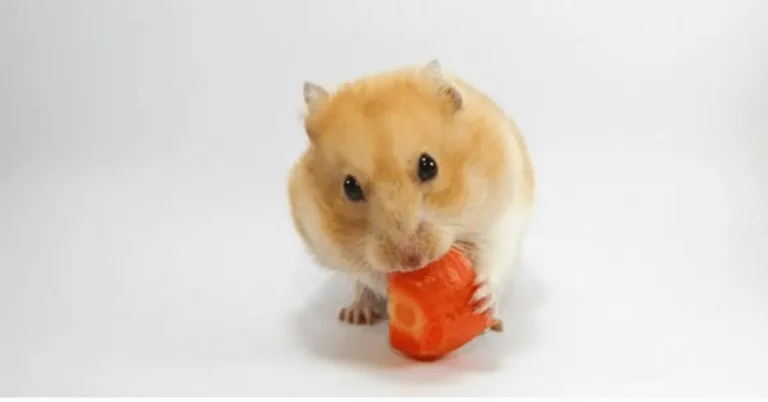Can Guinea Pigs Eat Cantaloupe? Guinea pigs can enjoy cantaloupe occasionally, but caution is necessary due to its sugar content. While this fruit provides valuable vitamins and nutrients, it should be treated as a treat rather than a daily staple. Moderation is crucial to prevent health issues like diabetes and obesity in guinea pigs. A balanced diet primarily consisting of hay and vegetables ensures optimal health, with fruits considered occasional snacks. Understanding the nutritional content of cantaloupe helps guinea pig owners make informed choices for their pets well being. In this comprehensive guide, we discuss the benefits, risks, hazards, serving size, and all you need to know about cantaloupe.
Can guinea pigs eat Cantaloupe?
Yes, guinea pigs can eat cantaloupe, but it should be given in moderation. Cantaloupe is relatively high in sugar, so it’s best to treat it as an occasional delight rather than a regular part of their diet. It can be a healthy supplement to their vitamin C intake and adds variety to their meals when provided in balanced amounts. Always introduce new foods slowly and in small quantities to monitor your guinea pig’s response.
Are Cantaloupe Good for Guinea Pigs? | Health Benefits
Yes, cantaloupe is suitable for your guinea pigs when served in moderation, offering several health benefits, such as:
Prevent Scurvy
Cantaloupe is an excellent source of Vitamin C, a vital nutrient that guinea pigs cannot produce on their own. Lack of Vitamin C can cause scurvy, which is a common health issue in guinea pigs. By including cantaloupe in their diet, you ensure your guinea pig receives the necessary Vitamin C to prevent such deficiencies.
Boost Immunity
Different vitamins and minerals are present in cantaloupe that contribute to the development of a strong immune system in guinea pigs. A strong immune system enhances their ability to resist diseases, promoting overall well being and a longer life.
Proper Growth of the Body
Cantaloupes are rich in essential nutrients like Vitamin A, Folate, and phosphorous, crucial for the healthy growth of a guinea pig’s body. These nutrients are involved in the formation of healthy tissues and the proper functioning of organs.
Hydration
guinea pigs eat Cantaloupe because it is a high water content in cantaloupe serves as an effective means of keeping guinea pigs hydrated. This is important because guinea pigs may not consume sufficient water on their own, especially in hot weather. Giving them water-rich snacks like cantaloupe helps make sure they stay hydrated.
Essential Nutrients
Guinea Pigs Eat Cantaloupe and it offers many important nutrients such as Vitamin B6, Vitamin K, Potassium, Magnesium, and Fiber. Each of these nutrients plays a unique role in supporting the overall health and well being of guinea pigs.
Antioxidant and Anti-Inflammatory Support
The presence of antioxidant and anti-inflammatory compounds in cantaloupe provides additional health benefits. These things help fight stress in the guinea pig’s body and protect them from sickness and inflammation.
Nutrition Facts of Cantaloupe for Guinea Pigs
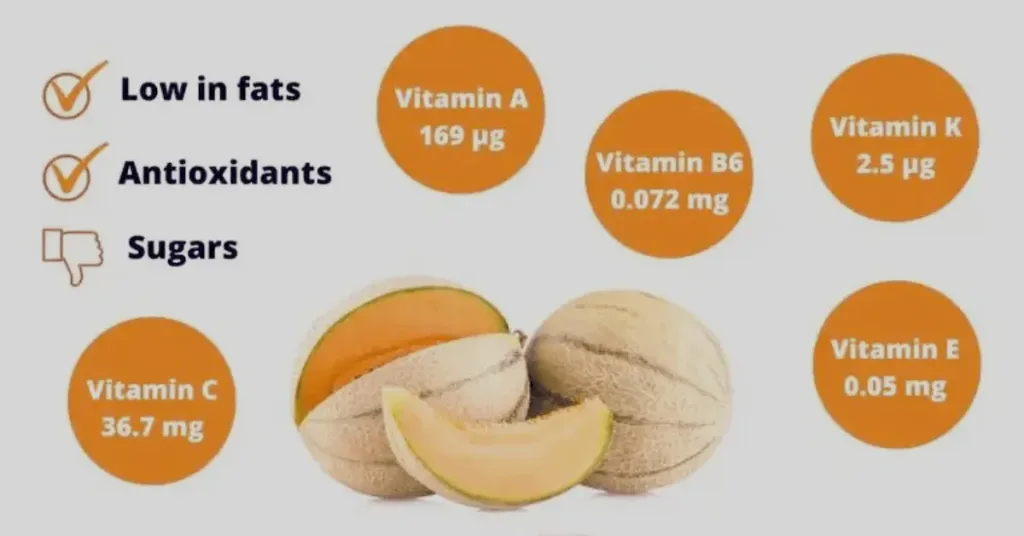
Nutrition information for 100 g of cantaloupe
| Nutrition | Amount |
| Energy | 34 kcal |
| Protein | 0.84 g |
| Total lipid | 0.19 g |
| Carbs | 8.16 g |
| Dietary Fiber | 0.9 g |
| Sugars | 7.86 g |
| Calcium | 9 mg |
| Iron | 0.21 mg |
| Magnesium | 12 mg |
| Phosphorus | 15 mg |
| Potassium | 267 mg |
| Sodium | 16 mg |
| Vitamin C | 36.7 mg |
| Vitamin B-6 | 0.072 mg |
| Vitamin A | 169 µg |
| Vitamin E | 0.05 mg |
| Vitamin K | 2.5 µg |
| Lutein + zeaxanthin | 26 µg |
Guinea Pigs Eat Cantaloupe? The above table shows the different nutrients available in cantaloupe. Most of them are needed by guinea pigs to stay strong and healthy.
Lets evaluate some of them nutrients to understand their impact on the body systems of both guinea pigs and humans. Just like Cantaloupe we also discuss can guinea pigs eat marigolds?
Calcium
Calcium is very important for guinea pigs and plays a crucial role in their development, making their bones and teeth strong. Young guinea pigs need enough calcium as they grow. Similarly, humans also need calcium for strong bones, facilitating blood clotting, and ensuring the proper functioning of muscles and nerves. If guinea pigs don’t get enough calcium, they might become weak and unhealthy. Similarly, humans need calcium too to keep their bones strong and stay healthy. It’s a super important nutrient for all living things.
Phosphorous
Phosphorus is essential for guinea pigs as it plays an important role in the formation of DNA, RNA, and ATP. It also keeps their bones strong and aids in energy metabolism. Similarly, humans need phosphorus for similar functions, such as bone formation, energy storage, and the synthesis of nucleic acids. Phosphorus also helps guinea pigs in the absorption of other nutrients, including protein and fats, from the variety of snacks and food consumed by guinea pigs. It’s like a helper nutrient for their bodies.
Potassium
Potassium is a very important mineral with essential roles in fluid balance, heart health, muscle function, and stone formation prevention in both guinea pigs and humans. It regulates cellular function, supports cardiovascular health, ensures proper muscle contraction, and reduces the risk of stone formation. it is good to give them potassium-rich foods in their diets, such as leafy greens for guinea pigs and Humans can get potassium from fruits like bananas. . Maintaining an appropriate potassium level through a balanced diet is super important for the health of both guinea pigs and humans.
Vitamin A
Vitamin A is crucial for both guinea pigs and humans, offering various benefits such as supporting vision, boosting the immune system, promoting skin health, ensuring healthy growth, and contributing to hormone formation. It plays an important role in maintaining overall well being. However, it’s essential to provide a balanced diet to prevent excessive intake and potential toxicity. Consulting with a veterinarian or healthcare professional is recommended for personalized dietary guidance for guinea pigs.

Potential Risks and Side Effects of Cantaloupe for Guinea Pigs
Guinea Pigs Eat Cantaloupe. While cantaloupe can be a delicious and nutritious treat for your guinea pigs, it’s essential to be aware of potential risks and side effects associated with its consumption. Taking care of your guinea pig involves balancing their diet to prevent health issues. Here are some considerations:
1. Obesity & Diabetes
Cantaloupe consists of natural sugars that are usually safe for guinea pigs when consumed in moderation. However, a diet that is high in sugar can lead to obesity and, in some cases, diabetes. It is important to give them a balanced diet and limit sugar content in their diet to prevent these health concerns.
2. Diarrhea
Guinea pigs have sensitive digestive systems, and sudden or excessive changes in their diet can lead to diarrhea. If you feed a large quantity of cantaloupe, it could cause digestive upset in your guinea pigs. It is important to monitor their food and signs of diarrhea, such as loose or watery stools.
3. Bloating
Cantaloupe is an alkaline fruit, and small amounts are usually easy for guinea pigs to digest. However, too much over a long time might make them feel bloated. Monitoring their response to cantaloupe and adjusting serving sizes can help prevent discomfort.
Serving Size and Frequency of Cantaloupe for Guinea Pigs
How Much Cantaloupe Can You Feed Your Guinea Pig?
Guinea pigs can enjoy cantaloupe as a tasty treat, but moderation is crucial. For adult guinea pigs, an appropriate serving size is about 2 squares of 1×1 inch. However, baby guinea pigs should avoid cantaloupe until they mature.
When introducing cantaloupe, start with a small portion, such as half an inch, to allow your guinea pig’s digestive system to adjust. Monitor their response and avoid overfeeding, as excessive amounts can lead to digestive issues.
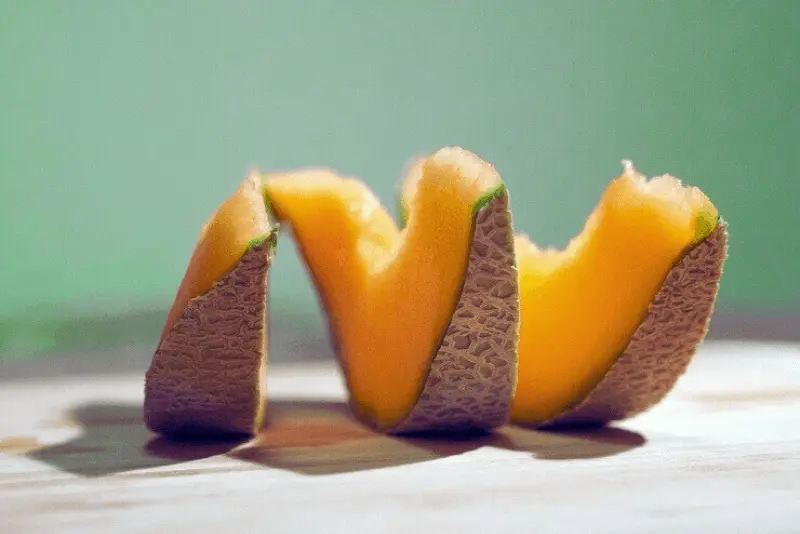
It’s essential to be attentive to any signs of discomfort, lethargy, or diarrhea. If your guinea pig reacts positively and shows no adverse effects, you can gradually increase the serving size. Always ensure the cantaloupe is fresh and thoroughly washed before offering it to your furry friend.
Remember, cantaloupe should be treated as a occasional snack, not a staple in their diet. A well-balanced and diversified diet is crucial for the overall health of your guinea pig.
How often can guinea pigs eat cantaloupe?
Cantaloupes are a tasty treat for guinea pigs, but it’s important to give them in moderation. Ideally, offer this sweet snack once a week, or you can spoil them a bit with twice a week. However, avoid giving it too often to prevent excess nutrients. While guinea pigs may eagerly ask for more, it’s crucial not to overindulge them.
Similar to humans avoiding too many sugary treats, guinea pigs need a balanced diet. Providing cantaloupe once or twice a week strikes a good balance. Avoid offering it on the same day as other sweet snacks, adjusting portions to maintain a well-rounded diet.
Cantaloupe contains various nutrients, and excessive amounts, especially of vitamin C, can be problematic. Despite guinea pigs’ love for eating, it’s best to treat cantaloupe as an occasional, special snack, not an everyday food.
To ensure the happiness and health of your guinea pigs, accompany cantaloupe with a cup of vegetables. This practice ensures they have nutritious food after enjoying the tasty fruit, contributing to their overall well-being.
More Information About Guinea Pigs and Cantaloupe
Can Guinea Pigs Eat Cantaloupe Seeds?
No, Guinea pigs should not eat cantaloupe seeds because the seeds pose a choking hazard and may contain traces of cyanide, which can be harmful and even fatal to guinea pigs. It is crucial to remove all seeds from cantaloupe before offering it to your guinea pig to ensure their safety and well being.
Can Guinea Pigs drink cantaloupe juice?
No, guinea pigs should not be given cantaloupe juice. In fact, it’s advisable not to offer any type of juice to guinea pigs. Juices often contain additional sugars and additives to enhance flavor, which can be harmful, especially considering the already high nutrient content in cantaloupe. It’s best to steer clear of serving guinea pigs any form of juice to ensure their well-being.

Avoid providing cantaloupe juice to guinea pigs, as it contains added sugars and other ingredients that can be detrimental to their health. Instead, offer fresh slices of cantaloupe to meet their nutritional needs without the risks associated with juice consumption.
Can guinea pigs eat cantaloupe rind?
Feeding guinea pigs cantaloupe rind is not recommended due to its tough texture, which may lead to digestive issues. The rind can harbor pesticides used in conventional farming, and despite washing, traces may persist. Additionally, the wax applied during production could contain unsuitable substances. To prioritize guinea pigs’ health, it’s safer to exclude the rind and offer fresh cantaloupe slices, ensuring a delicious and safe treat aligned with their dietary needs. Always choose fruits and vegetables free from potentially harmful elements for a happy and thriving pet.
Can guinea pigs eat frozen Cantaloupe?
No, Guinea pigs at Cantaloupe and should not be fed frozen cantaloupe. This can potentially lead to diarrhea in guinea pigs. It is crucial to thaw the cantaloupe properly and bring it to room temperature before serving it to your guinea pigs. While frozen cantaloupes may be a delightful treat for humans, they are not suitable for guinea pigs, as cold and frozen foods can cause health issues for them. If you have frozen cantaloupes, ensure they are thawed to room temperature before offering them to your guinea pigs to ensure their well being.
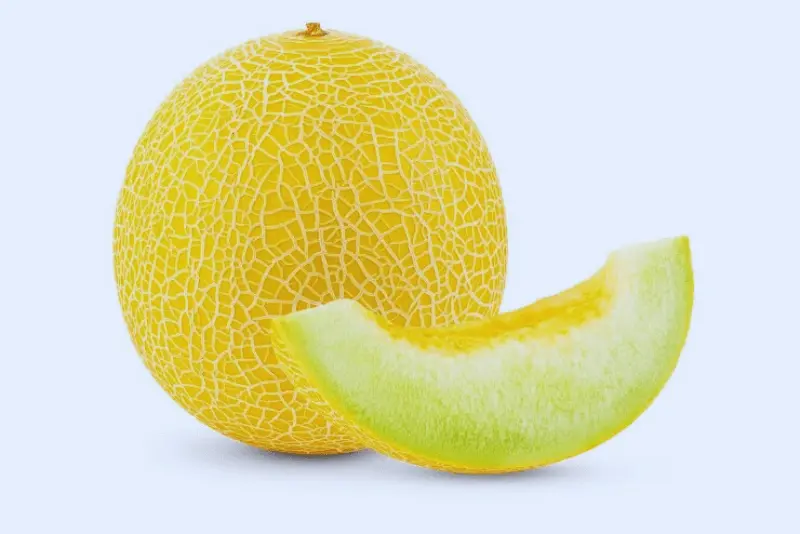
FAQ’s
Is cantaloupe safe for guinea pigs?
Yes, cantaloupe is safe for your Guinea pigs if you provide them in moderation.
Can Cantaloupe make my guinea pig sick?
Yes, unfortunately, sweet foods like cantaloupe, which consist of an excessive amount of sugar, can make your guinea pigs sick and may cause diarrhea and bloating if given in excess.
Will guinea pigs become fat if they eat cantaloupe twice a day?
Guinea pigs eat cantaloupe and if u feed twice a day may lead to weight gain and health issues. It’s best to offer it as an occasional treat in small, infrequent portions within a balanced diet. Monitor their weight and consult a veterinarian for personalized dietary advice.
Conclusion
Guinea pigs eat cantaloupe and it can be a tasty and nutritious treat for guinea pigs, it’s crucial to offer it in moderation. Limiting the frequency, avoiding seeds and rind, and ensuring the fruit is fresh and properly prepared are essential considerations. Additionally, monitoring guinea pigs for any adverse reactions and consulting with a veterinarian for personalized dietary advice contribute to their overall well being. By following these guidelines, guinea pig owners can safely incorporate cantaloupe into their pets diet as a delightful and healthy occasional treat.


